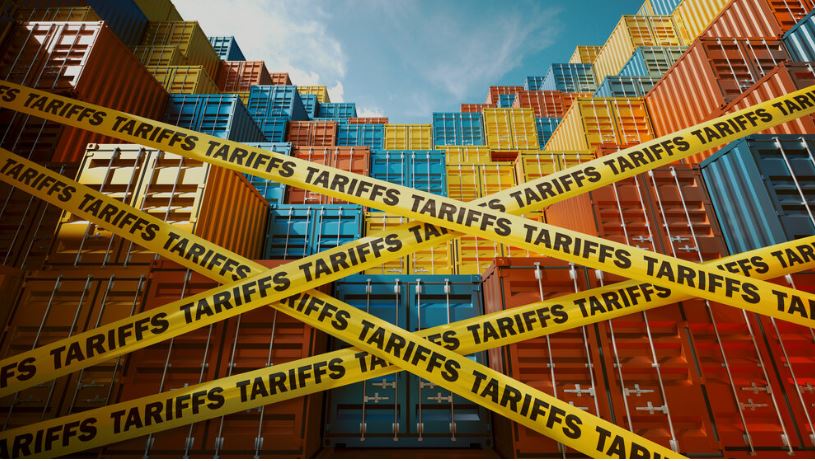
Learn how tariffs can impact your business and ways you can protect against them.
Businesses are more susceptible than ever to the complex dynamics triggered by tariffs and foreign policy changes. As political winds shift, unexpected turbulence can disrupt international trade patterns, shake supply chains and impact your bottom line.
What are tariffs?
Tariffs are taxes or duties that governments impose on imported goods. Importers pay these taxes, which are calculated as a percentage of the commodity’s total value. High tariffs on high-cost items mean significant increases in the cost of obtaining a product.
In theory, tariffs can help protect domestic industries from foreign competition by making imported goods more expensive. Since foreign-produced goods cost more due to tariffs, locally produced goods can become a cheaper alternative. And when consumers buy domestic products, the country’s economy gets a boost. Tariffs are also a source of government revenue.
However, tariffs can negatively impact businesses as well, especially those relying on imported materials or goods.
Here are ways tariffs can affect businesses:
Increased costs for business owners and consumers
If a business relies on imported materials or goods, tariffs can directly increase its costs. The business then passes those costs on to the consumer. Increased uncertainty often results in higher prices as businesses try to balance profits with the cost of doing business. As costs rise, consumers sometimes take their business elsewhere or stop buying altogether.
Supply chain disruptions
Many businesses have global supply chains, and tariffs can disrupt them. For example, raising tariffs on raw materials like wood or steel could force companies to find new suppliers, which takes time. In the interim, they usually raise prices to continue doing business until they find alternatives. Depending on the industry and the type of goods, alternative suppliers could take years to source. This can cool business expansion and lead to missed projects and lower profits.
Retaliatory tariffs
Other countries might respond to tariffs by imposing reciprocal tariffs. This can hamper a business’s ability to export its products, impacting global sales and profitability. It can also hurt local businesses’ ability to plan projects and provide consumer quotes. For example, if a construction company is lining up its client schedule, it might quote projects a season in advance. Retaliatory tariffs make projecting profits and quoting projects difficult. This affects their ordering, hiring and long-term profitability. It can lead to significantly higher prices for consumers.
Economic uncertainty
Tariffs can cause uncertainty, particularly if they lead to trade wars. This uncertainty may deter businesses from long-term investments and slow economic growth.
Competitive disadvantage
Ironically, tariffs can disadvantage the domestic industries they are meant to protect. For instance, if a country imposes a high tariff on imported steel, companies that use steel to produce their products may end up paying more for their supply than their foreign competitors. Foreign companies could outperform domestic companies in sales because they can access cheaper steel.
Increased insurance costs
Tariffs are just one piece of a larger picture, but higher prices usually mean increased insurance premiums. Since tariffs raise the cost of goods like raw materials and finished products, they can also lead to higher repair and replacement costs. For instance, if tariffs are imposed on imported cars, the cost of repairing them would also increase. Even domestic vehicles could cost more to repair, depending on where the parts are manufactured. The cost of repairing and replacing products directly affects the insurance industry. The same is true for commercial property. An increase in the cost of materials due to tariffs would mean higher costs to rebuild or repair properties.
Risky operations and increased liability
Some businesses might respond to tariff-driven pricing by cutting corners to maintain their profit margins. For example, an auto repair shop might use aftermarket or other off-brand parts to compete even if it’s not in the best interest of their clients. Knowing the ethics of your supply chain providers is key to maintaining high standards, no matter the economic trends.
While tariffs can sometimes bolster domestic industries, they can also harm them.
Insurance solutions for the negative impacts of tariffs
There are insurance solutions for risks due to tariffs:
Global trade or trade credit insurance protects you against losses when your clients don’t pay due to insolvency, bankruptcy or trade wars. If you export goods, you might see an uptick in non-payments due to unexpected tariffs.
Supply chain insurance protects you from losses incurred due to interruptions or disruptions in your supply chain. Disruptions could arise for various reasons, ranging from natural disasters and logistical problems to sudden tariff changes. These sudden tariff changes can lead to delays or increased costs. For example, if your business relies on microchips from a supplier in another country, a tariff war could make the cost of the microchips prohibitive. A supply chain insurance policy could help cover some of the income loss.
Political risk insurance protects against political events that interrupt your operations or affect your investments. Imposing tariffs could change trade policies or cause trade wars, which would be covered under this type of policy. Trade disruption insurance is a form of political risk insurance covering losses from events (like tariffs) that disrupt trade. Covered losses include import or export embargos, confiscation of property, and changes in foreign policy.
Non-damage business interruption insurance can help with temporary income replacement if you must halt or slow down your operations due to increased tariffs.
Cargo or transit insurance can offset the risk of switching your cross-border cargo provider due to increased tariff contentions. Cargo insurance safeguards against losses or damages to goods during transportation by sea, air, or land.
Diversifying your supplier base is also important, as it can help reduce dependence on imports and shield you from other supply chain issues.
Call your agent for insurance solutions
Each type of insurance offers a different layer of protection against the risks associated with tariffs. Of course, you’ll need to balance the cost of a policy with the revenue you could lose due to a supply chain snafu. Your insurance agent can run the numbers and help you decide.


